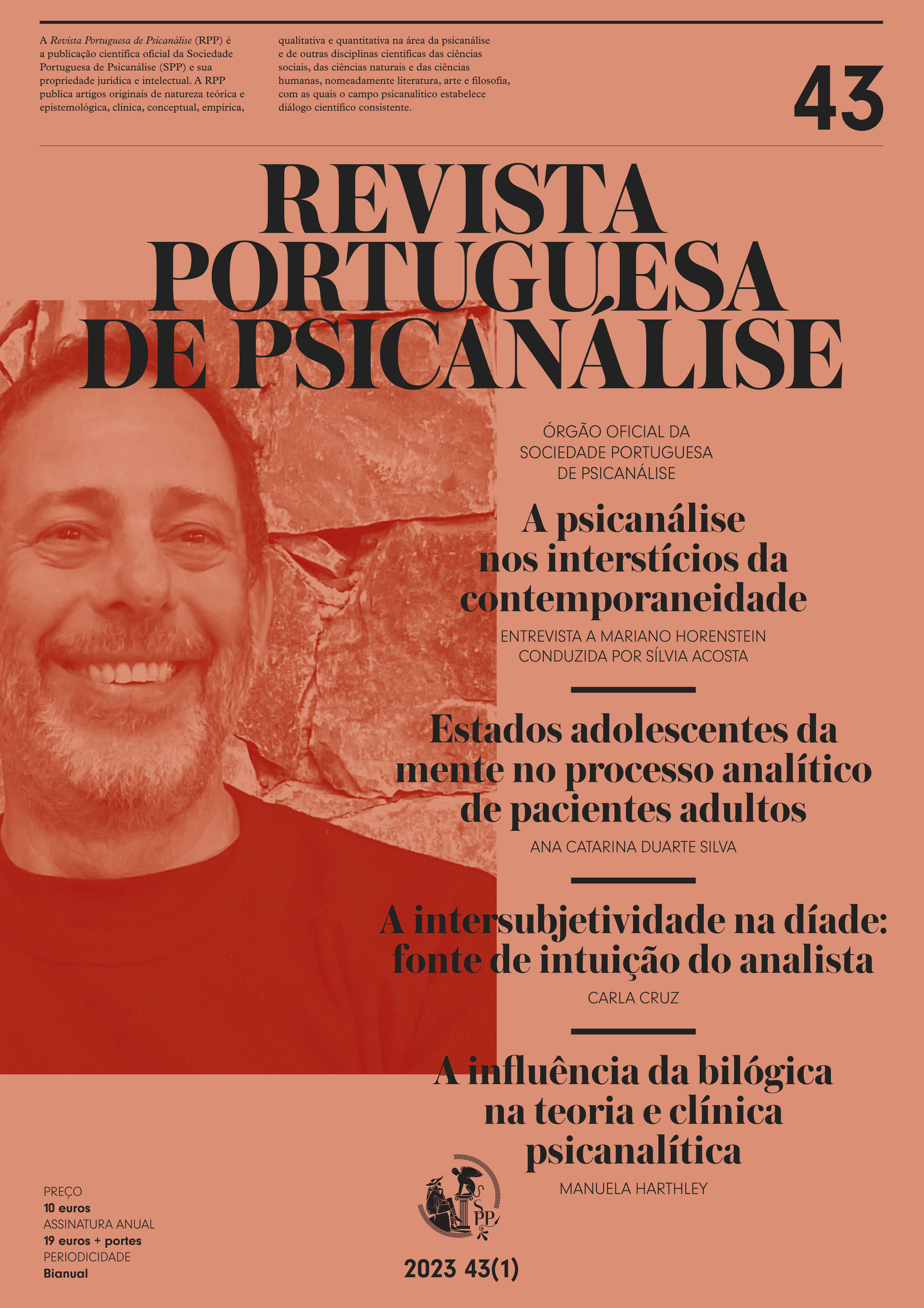Identificação projetiva, função objetalizante e narratividade: 'après-coup' da psicoterapia psicanalítica de um adolescente

Abstract
Projective identification, objectifying function and narrativity: 'après-coup' of psychoanalytic psychotherapy of an adolescent
Some years after the end of a psychotherapy, the author elaborates on the role of projective identification in the construction of a therapeutic relationship with an adolescent boy whose life had been marked by traumatic events. His paternal aunt — his parental guardian — sought psychological help due to his school phobia, but the immediate reason for seeking help was his recent hospitalization with acute somatization without an underlying organic cause. In a short time, already in the beginning of therapy, he starts using cannabis, and his behavior problems increase in severity.The construction of an intersubjective space during psychotherapy allowed the gradual emergence of symbolization and creative elaboration, leading to a mitigation of the deadly self-object confusion, mostly manifested as acting out, in narcissistic regression — the legacy of trauma.The objectifying process that creates objects from these transformed pulsions continues to resonate in the author’s remembrance of the psychotherapeutic process — and will be inscribed in a later work. The narrative symbolization of this encounter expanded beyond its immediate context, evoking a constellation of cultural, literary, and artistic objects, articulated with concepts from various psychoanalytic authors.
Keywords
Projective identification, Objectifying function, Narrativity, Therapeutic relationship, Symbolization
Author Biography
João Mendes Ferreira
Psicólogo clínico da Sociedade Portuguesa de Psicanálise (SPP) e da International Sándor Ferenczi Network.
References
- Almodóvar, Pedro. (2002). Fala com Ela [Hable con ella] (filme). Espanha.
- Assoun, P.-L. (2009). Dictionnaire Thématique,
- Historique et Critique des Œuvres Psychanalytiques. Presses Universitaires de France.
- Bion, W. R. (1963). Elements of Psycho-Analysis. Heinemann.
- Bollas, C. (2013). The Freudian Moment: New Edition with Foreword by André Green. Karnac Books.
- Coelho, J. F. T. (1891). Os meus amores. Biblioteca Ulisseia de Autores Portugueses.
- Dreyer, C. T. (1955). A Palavra [Ordet] (filme), Dinamarca.
- Ferenczi, S. (1970). Le développement du sens de la réalité et ses stades. Em O. C., Psychanalyse, t. II, 1913-1918 (pp. 51–65). Payot. (Original publicado em 1913.)
- García Márquez, G. (1981). Crónica de uma Morte Anunciada. Dom Quixote.
- Green, A. (1983). Narcissisme de vie, narcissisme de mort. Les Éditions de Minuit.
- Green, A. (1993). Le Travail du négatif. Les E?ditions de Minuit.
- Green, A. (1995). Propédeutique. La métapsychologie revisitée. L’Or d’Atalante.
- Green, A. (2002). Idées directrices pour une psychanalyse contemporaine. Me?connaissance et reconnaissance de l’inconscient. Presses Universitaires de France.
- Grimal, P. (1951). Dicionário da Mitologia Grega e Romana. Difel.
- Helder, H. (1997). Poemas Ameríndios: poemas mudados para portugue?s por Herberto Helder. Assírio & Alvim.
- Hinshelwood, R. D. (1994). Clinical Klein: From theory to practice. Basic Books.
- Jacques, J.-P. (2001). Para acabar com as toxicomanias. Psicanálise e fornecimento legalizado das drogas. Climepsi.
- Klein, M. (1957). Envy and Gratitude and Other Works. Hogarth.
- Klein, M. (1975). Notes on some schizoid mechanisms. Em The writings of Melanie Klein III, 1946-1963 (pp. 1–24). Hogarth. (Original publicado em 1946.)
- Kristeva, J. (1998). Du sens au sensible : logiques, jouissance, style. Em R, Kaës & D. Anzieu (Eds.), Symbolisation et Processus de Création. Sens de l’intime et travail de l’universel dans l’art et la psychanalyse (pp. 77–97). Dunod.
- Lacan, J. (1966). Écrits. Le Seuil.
- Livro de Daniel (2017). Em Bíblia,Volume III, Antigo Testamento – Os Livros Proféticos (tradução do grego, apresentação e notas por Frederico Lourenço). Quetzal Editores.
- Lispector, C. (2002). A Hora da Estrela. Relógio D’Água. (Original publicado em 1977.)
- Mancia, M. (1992). No Olhar de Narciso. Ensaios sobre a Memória, o Afecto e a Criatividade. Escher.